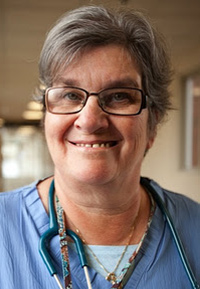NSMC News Releases
The Schwartz Center for Compassionate Healthcare, a national nonprofit organization dedicated to strengthening the relationship between patients and caregivers, has selected Suzanne Nevins, a neonatal nurse at North Shore Medical Center, as one of five finalists for its prestigious Schwartz Center Compassionate Caregiver Award.
 The winner will be Thursday at the Boston Convention Center. The other four finalists will also be recognized and honored. The dinner is one of the largest healthcare events in New England; last year, more than 2,000 healthcare providers, patients, and families attended.
The winner will be Thursday at the Boston Convention Center. The other four finalists will also be recognized and honored. The dinner is one of the largest healthcare events in New England; last year, more than 2,000 healthcare providers, patients, and families attended.
"In light of a national survey last year showing that only about half of patients believe the U.S. healthcare system is a compassionate one, we are pleased to be able to highlight caregivers like Sue who are providing compassionate care and making a huge difference in the lives of patients and families," said Schwartz Center Executive Director Julie Rosen.
Nevins, a West Peabody resident, has worked as a neonatal nurse in the Special Care Nursery at NSMC for 36 years.
According to NSMC chaplain Jane Korins, who nominated her, "Sue possesses the uncanny ability to discern each of her tiny patients’ unique personalities and instill confidence in the parents that their babies are recognized for their uniqueness."
She is also described as "the nurse you want to be there" when things go wrong. "I have worked by her side while we waited for the ambulances to arrive when babies are found unresponsive in their cribs," Korins says. "I have watched her place stillborn babies into the arms of their mothers and offer comfort while validating the horror of such a tragedy."
As part of her work, Nevins has developed programs for grieving parents, including running a monthly support group.
According to Nevins, caring for patients is an art.
"The medical part is easy," she says. "The challenge is the human part." Her patients include drug-addicted mothers and babies, teenage mothers, and older mothers transitioning from the role of well-versed professional to inexperienced new mom. For her, compassionate care means being there for all of her patients, whatever their walk of life, without judgment.
Nevins’ awareness of the critical role that compassion plays in the patient-caregiver relationship became even stronger when she suffered from a medical complication during a surgery of her own. She turned this personal trauma into a positive experience by becoming an advocate for open communication between patients and caregivers after a medical complication. She also reached out to her surgeon, knowing he was suffering too. Since the incident, Nevins and her surgeon have worked together to ensure that all patients who experience medical complications are treated compassionately.
"Regardless of which area I work in, be it loss, neonatal nursing or postpartum care, I feel that compassion is what I bring to each encounter," Nevins says. "The patient does not remember the color of the walls or the computer I used, but they do remember I cared."
According to NSMC President and CEO Robert Norton, "It is an honor to work with Sue Nevins and to witness the extraordinary dignity she extends to each and every patient. She sets the standard for compassion and provides a model for all of us at NSMC to follow."
The finalists were selected by a review committee based on how well they embody the characteristics of compassionate care, which include effective communication and emotional support, mutual trust and respect, involving patients and families in healthcare decisions, and tating patients as people, not just illnesses. Approximately 100 caregivers from throughout New England were nominated this year.
The Schwartz Center for Compassionate Healthcare was founded in 1995 by Ken Schwartz, a Boston healthcare attorney who died of lung cancer at the age of 40 and found that what mattered to him most was the compassionate care he received from his caregivers, which he said "made the unbearable bearable."
He established the Schwartz Center just days before his death to ensure that all patients receive compassionate care.

